- Home
- Tarryn Fisher
The Wrong Family Page 4
The Wrong Family Read online
Page 4
For their thirteenth birthday, they’d both been given little glass bowls with betta fish from their aunt Shea. A week later Dakota found that his betta had gone to the ocean in the sky. He’d stormed into the bedroom she shared with Chelsea and snatched the bowl from her desk. Winnie had tried to stop him, but he was already a foot taller than her and he held the bowl above his head, sloshing water on her face as she reached for it. He’d darted to the bathroom, then flushed Winnie’s very alive fish down the toilet along with his dead one as she wailed in protest. “Fair’s fair,” he’d said, pulling the lever. He’d felt bad as soon as he’d done it and had burst into tears. Winnie had forgiven him, of course, but sometimes all these memories came together in a very uncomfortable way. If he’d been like that with his twin sister, what was he like now with his wife, Manda?
Nigel was waiting for her to say something. She pushed her thoughts away. “I know—jeez—I know. He never recovered from Dad’s death. But he’s family, so we’ll just have to work this out. Be patient with him. Everyone can chip in.” Her voice was falsely positive. She sounded like a drunk cheerleader. And he wasn’t just family, he was her twin. There was extra responsibility that came with that.
After fifteen years of marriage, Winnie knew his stance without him having to say it—Nigel disagreed. He did not think Dakota and Manda were going to work it out. This was not his problem, nor was this his brother, nor did he believe in the twin bond. He didn’t want to chip in. There were perks to being an only child, Winnie assumed bitterly, and while Dakota moving in with them may have been a completely normal thing to Winnie, she knew that to Nigel, it felt like an extreme breach of privacy. Dakota lacked the respect of a good houseguest: he was a slob. He left dirty dishes all over the house, the remnants of frozen burritos congealing in red lumps, empty beer cans stacked on counters—and the tissues. Oh, God, every time he stayed with them there was so much crying. Nigel called them snotflakes—little hardened wads of white that made their house look like it was decorated for Christmas. Then there was the drinking problem, which had led to the horrifying moment for Samuel.
“Well, he’ll be there when you get home,” Winnie said. “He stopped by for the key. He can stay in the blue bedroom.”
“Uh-huh.”
“Are you mad? You sound mad.”
“I’m mad,” he said. “But it doesn’t make a difference because you already moved him in without talking to me about it.”
Winnie said nothing.
“If he so much as looks at me the wrong way, Winnie...”
“I know, I know,” she said. Her breath exhaled in a whoosh. She could picture his chin dipped, eyes narrowed, pressing his tongue up against his front teeth. “I warned him,” she said. “I swear it’ll be okay. He’s in a bad place, but he’ll behave.”
* * *
When Winnie got home thirty minutes later, she found Dakota on his knees installing the doorbell Nigel himself had failed to install for some weeks. It was a peace offering. She watched him for a few seconds, dreading the whole night ahead of her; she’d get a decent serving of guilt from Nigel, and Samuel would turn his moodiness inward. Her concern for her son was already consuming her, and this was only going to make it worse. Why Winnie had said yes to this she did not know. Actually, she did know: her sister was a bully and Winnie was about as easy to manipulate as a hungry dog. Dakota had music playing as he worked, a whiny country song. She heard him humming along to it and her heart softened. She still saw her brother as a little boy.
“Hey, you.” Her brother jumped at the sound of her voice. He was still wearing his uniform—Nigel always said he looked like a baked potato in his courier uniform. Dakota stood up, suddenly reminding Winnie of how tall he was. He resembled their father, six-four and beefy. Winnie had to bend her head back a little to look into her brother’s face, which was contrite. His red-rimmed eyes wouldn’t meet hers when he said, “I’m really appreciative you all are letting me stay. Manda...”
At the sound of his wife’s name on his own tongue, the six-foot-four-inch brute of a man burst into tears. And that was the moment Nigel pulled into the driveway.
Winnie seated Dakota at the dinette, and Nigel made tea for the three of them. It was something his mother did when someone was upset. She watched as he handled the little bags of tea and the cubes of sugar. He poured a few beats of whiskey into his and Winnie’s mugs, noticeably skipping Dakota’s, and Winnie held her tongue. She knew better than to give Nigel a hard time about drinking, especially after forcing Dakota on him. She felt she’d need the alcohol herself. Dakota took the mug gratefully.
Winnie sucked the warm liquid between her teeth and eyed Dakota over the rim of her mug. Her sisters still crooned about how handsome he was, but she was starting to see the emergence of a much scruffier man. He’d had a six-pack through high school and college, and despite living in a cold, rainy state, he’d spent much of his adolescence shirtless to let everyone know. Sitting close to him now, Winnie could see that his hair was thinning and his nose was starting to take on the bulbous appearance of a seasoned alcoholic.
“You should shower, dude, shave. You’ll feel better.” Nigel was eyeing Dakota with much less tact than she had. She meant to give Nigel a look to say he’d crossed a line, but Dakota nodded solemnly.
“I lost my job today.”
Nigel’s mug landed on the table with a hard thud. Winnie squeezed her eyes closed. No, no, no.
“Why?” That strangled word was all she could manage.
“Got in a fight with some guy.”
Nigel leaned forward, disbelieving. “‘Got in a fight with some guy’? What? At work?”
Dakota nodded. “He had it coming.” He said this very seriously. Winnie saw her husband’s fist clench. Oh boy, here it comes, she thought.
“Are you kidding me, Dakota? Your marriage is hanging by a thread, you gambled your mortgage payment, and now you got yourself fired because you wanted to play street fighter on the job?” This time it was she who said it, and both her husband and brother looked at her in surprise. Winnie could play bad guy, too.
Dakota started to cry again, his big head drooping over his almost empty mug. She could see the scar on the bridge of his nose, the one he got from fighting with Nicholas Bowcamp when he was in the tenth grade. The fight was over a comment Nicholas had made about their recently deceased father. Dakota shoved Nick, and he rebounded with a right hook that broke Dakota’s nose. Winnie remembered watching the whole thing go down from the stairs in front of the school, her stomach in her throat as she watched her twin beat Nicholas Bowcamp into the pavement. If it happened today, there would be dozens of videos all over the internet, but the most people did that day was watch and cheer. The boys were technically off school property. Nicholas Bowcamp spent two days in the hospital with a concussion. “He’s just lost his father,” their mother told the police officer who had come by the house. “He’s not usually like this.” The Bowcamps, who were devout Catholics, conferred with their priest and decided against pressing charges so long as Dakota sought counseling. The counseling had seemed to work for a while, and Dakota had attended youth group at a nondenominational church and gone on a mission trip to Mexico. He spouted Bible verses all summer and volunteered at the local animal shelter. Winnie remembered him always smelling of wet dog during that time. It was all fine and dandy until his senior year when he seemed to change overnight, shrugging off his religion and replacing it with a deep melancholy. He started smoking cigarettes and was suspended twice in one quarter for fighting.
Winnie was about to comfort him when she heard the front door open. A few seconds later, Samuel came bounding into the kitchen, a soccer ball tucked under his arm. He had what Winnie called the “hungry lion” look on his face. He headed straight for the fridge with barely a glance at the table where his uncle and father sat.
“Samuel,” Nigel said. “Say hello to your uncl
e.”
Samuel turned around with a start, a Gatorade bottle at his lips. “Hello, Uncle,” he parroted. “Are you crying?”
Dakota launched into a fresh flurry of tears, sobbing into his hand. Samuel raised his eyebrows at his father and quietly exited the room without so much as acknowledging Winnie.
“Go to your room, Dakota,” Nigel said firmly. “And cry in the fucking shower.”
* * *
In an effort to redeem herself, she took Samuel to dinner that night, even though it was late, just the two of them. Nigel had opted to stay home and keep an eye on Dakota, but Winnie knew that what he really wanted was to find his bottle of Jack and coat his anger with it. The realization was there, right in front of her, and she still didn’t want to deal with it. They walked through the park, cutting across to the row of restaurants that all had Vegan Friendly signs in their windows.
Samuel had been quiet for most of their walk, kicking at stray rocks and sighing deeply whenever she said something.
“What are you hungry for?” she asked, her voice bright and falsely cheery. If Samuel hadn’t pointed to Quarter Deck at exactly that moment, she would have burst into tears. Okay, fine, that was something; at least he was giving opinions. She followed him to the host stand where he politely asked for a table for two. The thorny thoughts she’d been having washed away. He was a good boy; he did the right thing, even if he grumbled about it. And honestly, what teenager didn’t get a little growly? She felt better when they sat down at the table, water and menus in front of them. Winnie watched a woman and a boy a few years older than Samuel tuck into their food. They were talking animatedly to one another, the boy making gestures above his head while she watched him with her mouth ajar. The woman was one of those bohemian types. As Winnie watched, she lifted her burger to her mouth with fingers that were decorated in turquoise rings. They traded burgers after the first bite, nodding in approval as they swapped back again. She turned toward Samuel. “So, should we share a salad and a grilled cheese? You pick the salad.”
“I don’t want a salad.”
“Okay...then what about a quinoa bowl?”
Samuel was cracking his knuckles, watching the TV over the bar.
“Hey! I’m talking to you.” She saw him stiffen; he looked like a kid ready to bolt. Winnie saw a couple of heads turn their way; maybe that had come out wrong. She offered an apologetic smile. Backtrack, backtrack, backtrack...
“I’m hungry. I want to order!” she said in a more cheerful voice. She pushed his menu toward him, aware that the mother-son duo across the way were now watching them.
He looked at her through his lashes for a minute before seeming to accept the apology.
“I was thinking about getting a burger.” He didn’t look at her when he said it, but Winnie was glad. A little smile had crept onto her lips. He’d noticed the mother and son across the way, too; she’d seen him looking. A burger was a great idea.
“Good idea,” she said, glancing at the menu. “I will, too.” When the server came by, Winnie order two Impossible burgers with chips. She eyed the salads wistfully but shut her menu with a snap that blew her hair up around her face. That was what parenting was all about—the sacrifices. She would eat fake red meat if it meant bonding with her son.
The chips cut into the roof of her mouth. Winnie only flinched when Samuel wasn’t looking. She hated feeling judged by a thirteen-year-old. He ate them like they were as soft as cheese; she watched in amazement as their sharp little ridges folded like paper behind his teeth. She felt victimized, her mouth tender. She reached for her veggie burger instead. Samuel hadn’t touched his; he was too busy grinding up those vicious little chips. She was trying hard not to say anything; instead, she bit into her own with enthusiasm.
“Try your burger. It’s delicious.”
“I don’t think anything pretending to be something else can be delicious.”
Winnie set her sandwich down, frowning. She blotted at the ketchup in the corners of her mouth. “What are you talking about? I thought you wanted a burger.”
He looked up at her, his chin tilted in a challenging way. He reminded Winnie of a bull in that moment.
“I wanted a real burger.”
“Samuel!” she said, exasperated. “Come on. Now you’re just being ridiculous. You’ve had a hundred veggie burgers.”
“And I’ve never liked them.”
She replaced her sandwich on the plate and stared at him. “So you’re just not going to eat them anymore?”
“I’m not,” he said. “I’m going to eat meat from now on because I’m not a vegetarian.”
The food she’d already ingested rolled in her belly. Winnie felt sick. She’d spent thirteen years raising this boy in what she thought was the best way, and now he was dismissing their way of life so casually, like it didn’t mean anything.
“We’ll talk about it later. If you’re not hungry that’s fine, but your dad—”
“I am hungry. I ate all the chips and I’m still hungry.”
She knew that if she told him to eat his veggie burger the argument would continue and spoil what was left of the evening.
Samuel was scrolling through his phone now, and she noticed that he was reading an article in the Seattle Times about the homeless.
“Do you want dessert?” she asked, pushing her burger aside. His only response was to raise a curious eyebrow like he was being pranked. She lifted a finger to call the server over, her eyes never leaving his face.
“Can we have one of every dessert on the menu, to share?” she said, glancing at Samuel. His face was incredulous. “So long as they don’t have meat in them.”
He cracked a small smile. Truce! Winnie thought.
“Don’t you want to see the menu...?” the server asked. Winnie’s smile broke for a brief second. Hadn’t this stupid girl heard her? She was trying to be the cool mom. “Just one of everything,” she snapped. The girl nodded and walked away. Her expression said It’s on your dime, salty bitch.
“What are you reading?” Winnie asked.
“Nothing. Something for school.” He immediately closed the browser on his phone and set it face down on the table.
“You know, I used to work with the homeless, for my job, before you were born.” She expected him to ignore her, or—cue her personal least favorite—roll his eyes, but instead, he looked at her with interest.
“In what capacity?”
Capacity! Winnie almost snickered, but she knew how much that would offend Samuel. When she was his age, she certainly wasn’t saying words like capacity. Besides, she was used to his large vocabulary. She kept her face neutral.
“Well, I was a case manager for people with mental health issues. Some of my cases were...well...homeless.”
“Really? How old were they?”
Now that she had his attention, she didn’t plan on losing it. She shrugged as nonchalantly as possible. “All different ages, some as young as you, all the way up to people Granny’s age.”
“Why were they homeless?”
Winnie searched her mind for a good answer, one that would interest him.
“I had one guy, his name was Adam. He came up to Seattle when he was twenty-four, right after getting out of jail. He beat a guy up, that’s why he was in jail,” Winnie said, seeing the question on Samuel’s face. “He’d gone to school to be an engineer—before the fight and the jail time. But by the time he got out, his mom had disowned him, and he had no other family in the area.”
“So, nowhere to go,” Samuel concluded.
“That’s right. He came to Seattle because he heard he could get work up here, but the job didn’t pan out, and so he was homeless.” There was a long pause during which Winnie thought he was done discussing the topic, but then he propped his birdlike elbows on the table and rested his chin in his hand. “Did he have a mental illne
ss?”
“That’s none of your business,” Winnie said firmly. She could tell that switching to the mom role had cost her Samuel, because he looked away. She felt immediate regret. Should she have told him that Adam was diagnosed with schizophrenia and that on his twenty-sixth birthday he’d gone missing? The police hadn’t bothered to look for a homeless man, though they’d written up the report for Winnie and then told her to have a nice day.
“They have a very hard time, Samuel,” she offered gently. “Discussing their medical history is highly inappropriate.” But he was giving her that look that made her feel stupid.
“That was like fifteen years ago,” he said. “But it’s fine.”
“Thirteen,” Winnie corrected with a frown. “Don’t age me.” Samuel glanced up to check her face and seemed to relax at the joke. Winnie was sweating beneath her shirt. She hadn’t realized how hard this would be—parenting. People, for some reason, chose only to highlight the good parts: the cute chubby cheeks and cute little socks—not the temper tantrums and lollipop bribery it took to get them in the socks. Winnie tried to relax, softening her voice. “And you’re right. Adam was mentally ill. He also had PTSD from an incident in prison—” Winnie didn’t tell Samuel how violent the incident had actually been “—and he had a personality disorder and a bunch of other stuff.”
“Why did you stop working there?”
“I had you, silly. I wanted to be a mom.”
“Why couldn’t you have done both?” He almost sounded accusatory. She tried to bat the feeling away. She was projecting her own feelings onto her son.

 Jackal
Jackal F*ck Love
F*ck Love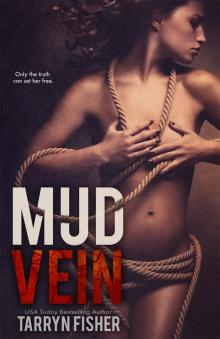 Mud Vein
Mud Vein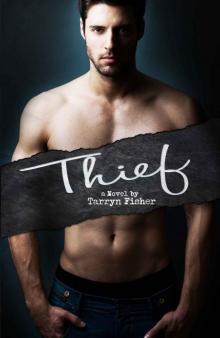 Thief
Thief Marrow
Marrow Dirty Red
Dirty Red Folsom
Folsom The Opportunist
The Opportunist Atheists Who Kneel and Pray
Atheists Who Kneel and Pray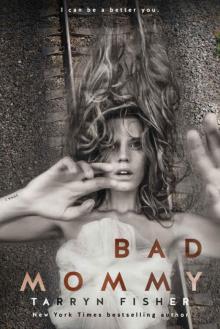 Bad Mommy
Bad Mommy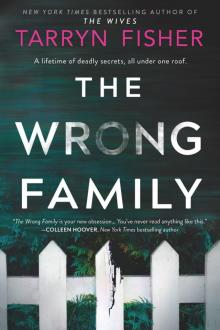 The Wrong Family
The Wrong Family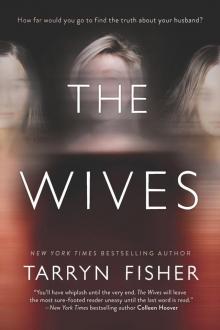 The Wives
The Wives Jackal (The End of Men Book 2)
Jackal (The End of Men Book 2) Folsom (The End of Men Book 1)
Folsom (The End of Men Book 1)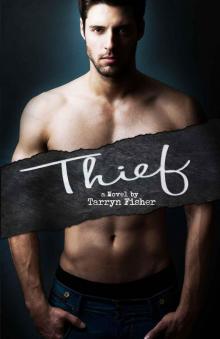 Thief (Love Me With Lies #3)
Thief (Love Me With Lies #3)